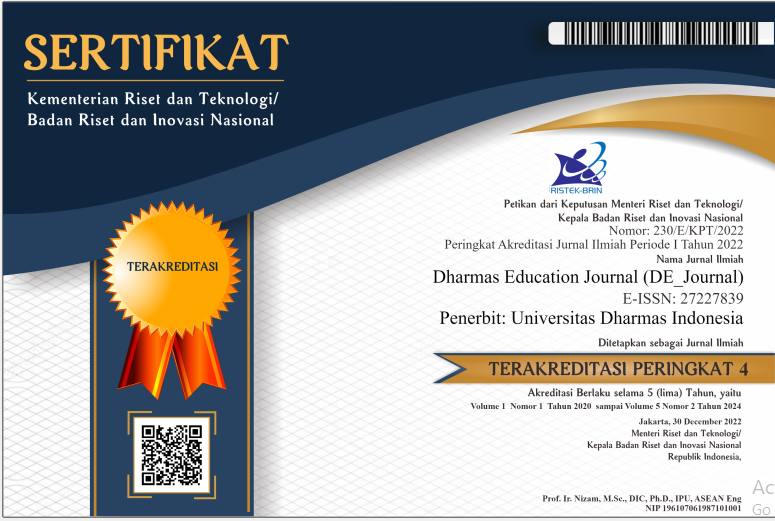A Pragmatic Analysis of Presuppositions In Moana 2
DOI:
https://doi.org/10.56667/dejournal.v6i1.1803Keywords:
Presupposition, Movie, MoanaAbstract
This study aims to identify the types of presuppositions found in the speech of the characters in the movie Moana 2 and describe the meaning of presuppositions in the transcript of the movie. The approach used is qualitative research with descriptive method and data analysis technique which includes steps: Organizing and Familiarizing, Coding and Reducing, and Interpreting and Representing. The data of this study are the speech of Moana, Maui, and three other crew members, Kele, Moni, and Loto in the Moana 2 script that contain presumptions. The theory of presumption used is Yule's theory, which includes Existential Presumption, Factive Presumption, Lexical Presumption, Structural Presumption, Non-Factive Presumption, and Counter-Factual Presumption. The results of data analysis show that there are five types of presumption in the movie script, with existential presumption being the most dominant type, which is 44% of the total 34 data. Furthermore, structural presumption is found as much as 23%, followed by factive presumption 15%, lexical presumption 9%, and counterfactual presumption 9%. This research provides an understanding of the use of presupposition in movie speech and its contribution in constructing meaning.
Downloads
References
Ambarita, S., & Johan, M. (2022). Types of Presupposition in “BBC” Instagram Social Media. IDEAS: Journal on English Language Teaching and Learning, Linguistics and Literature, 10(1), 858–873. https://doi.org/10.24256/ideas.v10i1.2719
Ary, D, Jacobs, L, & Sorensen, C. (2010). Introduction to research in education.
Askarizad, R., & He, J. (2022). Post-pandemic urban design: The equilibrium between social distancing and social interactions within the built environment. Cities, 124, 103618. https://doi.org/10.1016/j.cities.2022.103618
Bayeck, R. Y. (2022). Positionality: The Interplay of Space, Context and Identity. International Journal of Qualitative Methods, 21, 16094069221114745. https://doi.org/10.1177/16094069221114745
Creswell, John W. (2018). Qualitative Inquiry & Research Design: Choosing Among Five Approaches. SAGE Publications.
Denzin, N. K., & Lincoln, Y. S. (2011). The Sage handbook of qualitative research. SAGE Publications.
Dey, A. K. (2017). Malware Originated HTTP Traffic Detection Utilizing Cluster Appearance Ratio. 248–253.
Fitriani, D., & Johan, Mhd. (2023). An Analysis of Presupposition Triggers in “Turning Red.” IDEAS: Journal on English Language Teaching and Learning, Linguistics and Literature, 11(1), 457–470. https://doi.org/10.24256/ideas.v11i1.3522
Haryati, H. (2022). Presupposition in The Mystery and Thriller Film of “Escape from Pretoria". Journal of Pragmatics Research, 4(1), 122–136. https://doi.org/10.18326/jopr.v4i2.122-136
Hirose, M., & Creswell, J. W. (2023). Applying Core Quality Criteria of Mixed Methods Research to an Empirical Study. Journal of Mixed Methods Research, 17(1), 12–28. https://doi.org/10.1177/15586898221086346
Hutauruk. (2017). Speech Function In Facebook By Efl Learners Hkbp Nommensen.
Hutauruk, B. S., Murni, S. M., & Sinar, T. S. (2022). Speech Function and Presupposition in Indonesia Courtroom Discourse.
Igiri, T. O., Awa, J. O., & Ngwoke, R. I. (2022). Pragmatics of Presupposition in Human Communication in the English Language.
Lewar, E. S. B., Latifah, A., & Atoillah, T. F. (2023). Effective Communication in Social Life. Journal of Community Engagement in Health, 6(1), 79–82. https://doi.org/10.30994/jceh.v6i1.386
Marscha, C., & Lesmana, F. (2022). Representation of Single Father in the Movie Fatherhood. Jurnal Spektrum Komunikasi, 10(2), 138–147. https://doi.org/10.37826/spektrum.v10i2.278
Md. Mahroof Hossain. (2021). The Application of Grice Maxims in Conversation: A Pragmatic Study. Journal of English Language Teaching and Applied Linguistics, 3(10), 32–40. https://doi.org/10.32996/jeltal.2021.3.10.4
Pramesti, D. A., & Dieni, N. A. I. (2023). ANALYSIS OF PRESUPPOSITION USED IN ENCANTO MOVIE SCRIPT. LINGUAMEDIA Journal, 4(01). https://doi.org/10.56444/lime.v4i01.3783
Pranowo, P. (2020). THE ROLE OF CONTEXT IN THE INTERPRETATION OF PRAGMATIC MEANING. RETORIKA: Jurnal Bahasa, Sastra, Dan Pengajarannya, 13(2). https://doi.org/10.26858/retorika.v13i2.12666
Prasatyo, B. A., Ali, H. V., & Hidayati, D. (2023). Current Studies on Pragmatics Competence in EFL Learning Context: A Review. 13(2).
Ramadhani, S., & Mustikawati, Y. (2023). ILLOCUTIONARY ACTS UTTERED BY THE MAIN CHARACTER IN. 2.
Shabilla, R. K. (2024). SHABILLA RIZKYTA KURNIAWAN NPM: 1811040160.
Tang, W., & Wei, M. (2023). Streaming media business strategies and audience-centered practices: A comparative study of Netflix and Tencent Video. Online Media and Global Communication, 2(1), 3–24. https://doi.org/10.1515/omgc-2022-0061
Umar, T., Hartati, E., & Febrianto, D. (2018). A PRAGMATIC ANALYSIS OF PRESUPPOSITON FOUND IN THE CONJURING MOVIE. Prosiding Konferensi Pendidikan Nasional “Penguatan Karakter Bangsa Melalui Inovasi Pendidikan Di Era Digital,” 25(0). https://doi.org/10.5774/25-0-78
Wulandari, R., & Setyowati, R. (2022). PRESUPPOSITION ANALYSIS IN HOTEL TRANSYLVANIA MOVIE. 6.
Yule, G. (2022). The study of language. Cambridge university press.
Downloads
Published
How to Cite
Issue
Section
License
Copyright (c) 2025 Dharmas Education Journal (DE_Journal)

This work is licensed under a Creative Commons Attribution-NonCommercial-NoDerivatives 4.0 International License.
Makalah yang disampaikan diasumsikan tidak mengandung bahan propietary yang tidak dilindungi oleh hak paten















